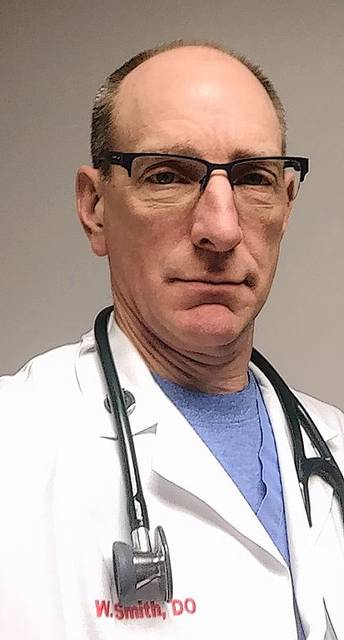
My patient, a 26-year-old mother of two, came to the ED by emergency squad because she developed shortness of breath and a cough for the third time in the past two months. I walked into the room and introduced myself to the wide-eyed young woman seated on the bed. It was immediately apparent that she was very anxious and in distress. Her breaths were shallow and she spoke to me with labored effort. “I can’t…breathe and I …can’t stop coughing!” My brief exam revealed distant breath sounds and wheezes in both her lungs.
I reassured her that I would do my best to help her feel better and ordered a breathing treatment for her which helped her bronchial tubes open and allowed more air to enter her lungs.
After two treatments she was feeling well enough to talk about her breathing. She told me how frightened she had been when felt as though she was unable to inhale enough air. She asked me why this was happening to her more and more frequently and what could she do to make herself better. I had noticed on her hospital chart that she was a smoker who often smoked two packs of cigarettes daily.
“Your previous chest x-rays have shown evidence of emphysema, which is a lung disease that is shown to be related to smoking,” I said.
She got quiet for a moment, then said, “I think I need to quit. Do you think that is what is making me sick so much?”
I gently replied to this insight, “Smoking certainly isn’t helping your health and is probably contributing to your respiratory problems. If you quit now, you may be able to reverse some of the damage that has been done to your lungs.”
She responded to this suggestion with her own additional reason. “I owe it to my kids to stop now. They were so scared when the ambulance showed up.”
“That’s good motivation to try and quit,” I replied.
Tobacco smoking remains one of the greatest public health challenges. According to the website Tobacco Free Kids (www.tobaccofreekids.org), over two million Ohio adults currently smoke and over 20,000 adults die each year from smoking-related causes. Smoking-related healthcare costs Ohio $5.64 billion dollars yearly. That’s $1,077 for every Ohio household.
Smoking tobacco is related directly to many diseases, including emphysema or Chronic Obstructive Respiratory Disorder (COPD), lung cancer, heart disease, stroke and high blood pressure. Smoking not only causes lung cancer but has been implicated in over a dozen other types of cancer, including pancreatic and liver cancers. Smoking causes the blood to thicken, which can cause blood clots in the legs or the lungs. It can worsen asthma and lead to reproductive issues in women such as tubal pregnancies and infertility. It is linked with low birth weight in infants and premature births if mothers smoke during pregnancy. For men, smoking causes erectile dysfunction. Did you know that you are more likely to develop Type 2 Diabetes if you smoke? What about cataracts (clouding of the lens of the eye) and macular degeneration (loss of vision)?
What about the effects on family members? Even if they don’t smoke around their kids, parents expose kids to cigarette smoke on their skin, clothes and hair. Research has linked that exposure to increased respiratory illness in children, increasing the risk for asthma as well as the number of ear infections when compared to children of non-smokers.
According to the British Journal of Medicine, an individual loses 11 minutes of life for each cigarette smoked. That’s 3 hours and 40 minutes of life you lose for every pack you smoke. The numbers add up. Smoking two packs per day for five years will shorten your life by an average of 1.5 years.
However, according to www.smokefree.gov, the advantages of quitting are numerous and almost immediate. Your risk of heart attack is reduced within 24 hours. While emphysema is not reversible, the lungs are better able to oxygenate the blood and regrow cilia (small finger-like projections that line the respiratory tract). This helps your body fight infections from viruses and bacteria. Smoking can cause damage to DNA which can lead to cancer but stopping smoking allows DNA to repair itself. The best way to lower your risk of cancer is to quit smoking. Your ability to taste and smell becomes more acute and your teeth become whiter. Your breath, clothes, home and car no longer smell like smoke. Need more compelling reasons to quit? How about this: a two pack per day smoker who quits will save over $4000 per year!
The health-damaging effects of smoking are huge. Quitting is difficult but there is help available. Resources include: www.smokefree.gov, which offers online resources to help and 1-800-QUIT NOW, a toll-free number that smokers can call to find free resources to help stop smoking. Locally, Mercy Health – REACH Services (Recovery, Education, Advocacy, Care and Hope) offers smoking cessation programs that help dozens of our neighbors quit smoking in Clark and Champaign counties. It has individual and group therapy available through a six-week program. Meetings take place Monday evenings from 5:30-7 p.m. Free nicotine replacement while supplies last. Call REACH Services in Urbana (937-653-3001) or Springfield (937-390-5338) for more information. If you are ready to quit smoking, tap available resources to help you reach your goal.


